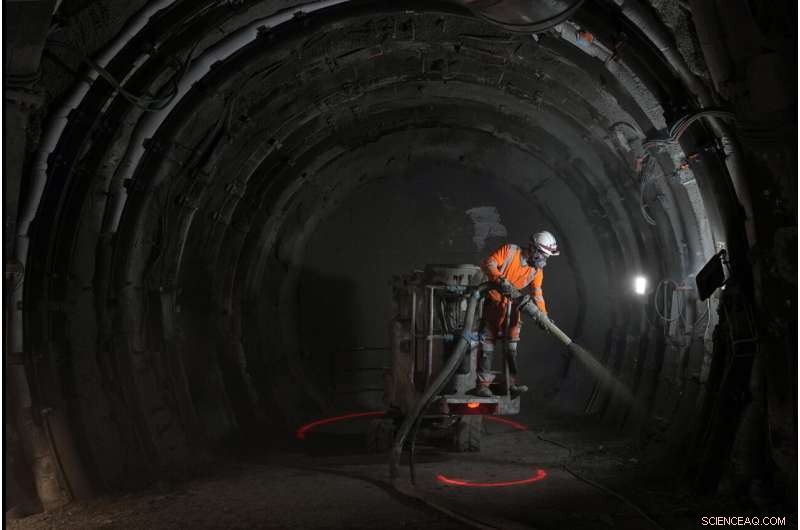
Um trabalhador pulveriza uma camada de proteção de cimento em um túnel para resíduos radioativos em um laboratório subterrâneo administrado pela Andra, uma agência que gerencia os resíduos, em Bure, leste da França, quinta-feira, 28 de outubro de 2021. A energia nuclear é um ponto de discórdia central enquanto os negociadores traçam a futura estratégia de energia do mundo nas negociações sobre o clima em Glasgow, Escócia. Crédito:AP Photo/François Mori
Nas profundezas de uma floresta francesa de carvalhos, bétulas e pinheiros, um fluxo constante de caminhões carrega um lembrete silencioso do custo muitas vezes invisível da energia nuclear:latas de lixo radioativo, indo para armazenamento pelos próximos 300 anos.
Enquanto os negociadores planejam como abastecer o mundo e ao mesmo tempo reduzir as emissões de carbono nas negociações climáticas na Escócia, a energia nuclear é um ponto central de discórdia. Os críticos criticam seu preço gigantesco, os danos desproporcionais causados por acidentes nucleares e os restos radioativos que permanecem mortais por milhares de anos.
Mas proponentes cada vez mais vocais e poderosos – alguns cientistas climáticos e especialistas ambientais entre eles – argumentam que a energia nuclear é a melhor esperança do mundo de manter as mudanças climáticas sob controle, observando que emite tão poucas emissões prejudiciais ao planeta e é mais segura, em média, do que quase qualquer outra. outra fonte de energia. Acidentes nucleares são assustadores, mas extremamente raros – enquanto a poluição do carvão e de outros combustíveis fósseis causa morte e doenças todos os dias, dizem os cientistas.
"A escala do que a civilização humana está tentando fazer nos próximos 30 anos (para combater as mudanças climáticas) é impressionante", disse Matt Bowen, do Centro de Política Energética Global da Universidade de Columbia. "Será muito mais assustador se excluirmos novas usinas nucleares - ou ainda mais assustador se decidirmos fechar as usinas nucleares todos juntos."
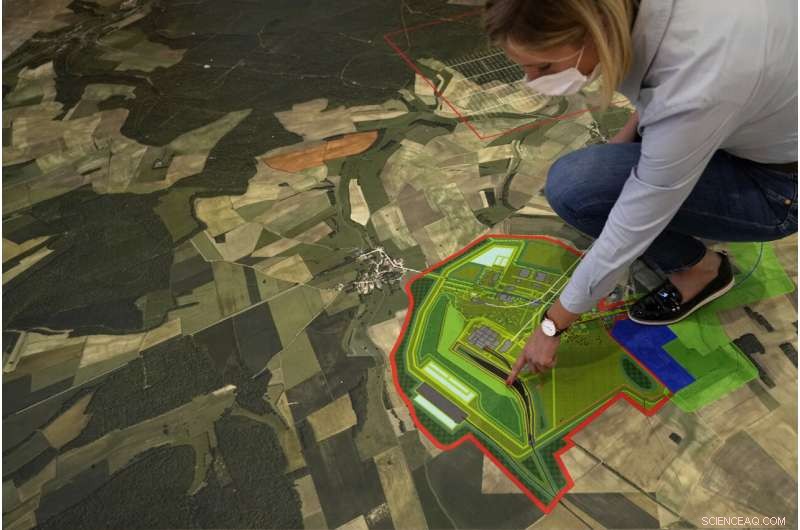
Audrey Guillemenet, geóloga e porta-voz, mostra um mapa de um laboratório subterrâneo administrado pela agência francesa de gerenciamento de resíduos radioativos Andra, em Bure, leste da França, quinta-feira, 28 de outubro de 2021. estratégia energética futura nas negociações sobre o clima em Glasgow, Escócia. Crédito:AP Photo/François Mori
Muitos governos estão pressionando para consagrar a energia nuclear nos planos climáticos que estão sendo discutidos na conferência em Glasgow, conhecida como COP26. A União Européia, enquanto isso, está debatendo se deve rotular a energia nuclear como oficialmente "verde" - uma decisão que direcionará bilhões de euros em investimentos nos próximos anos. Isso tem implicações em todo o mundo, pois a política da UE pode definir um padrão que outras economias seguem.
Mas e todo esse desperdício? Reatores em todo o mundo produzem milhares de toneladas de detritos altamente radioativos por ano, além do que já foi deixado por décadas de aproveitamento do átomo para eletrificar casas e fábricas em todo o mundo.
A Alemanha está liderando o grupo de países, principalmente dentro da UE, que se posicionam firmemente contra rotular a energia nuclear como "verde". Enquanto isso, o governo Biden apoia a energia nuclear, a China tem uma dúzia de reatores em construção – e até o Japão está promovendo a energia nuclear novamente, 10 anos após o desastre em sua usina de Fukushima.
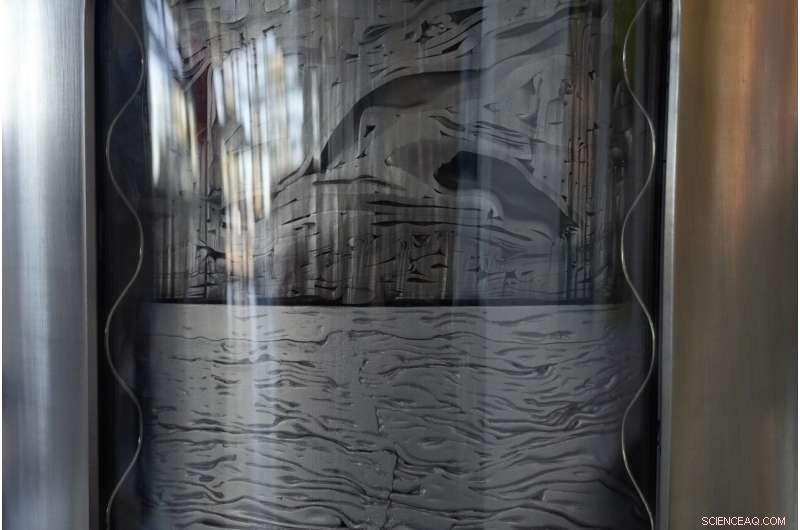
Uma exibição de resíduos radioativos compactados fica em um showroom ao lado de um laboratório subterrâneo administrado pela agência francesa de gerenciamento de resíduos radioativos Andra, em Bure, leste da França, quinta-feira, 28 de outubro de 2021. A energia nuclear é um ponto de discórdia central enquanto os negociadores planejam o a estratégia mundial de energia futura nas conversações sobre o clima em Glasgow, Escócia. Crédito:AP Photo/François Mori
Mas em nenhum lugar do mundo é tão dependente de reatores nucleares quanto a França, que está na vanguarda do impulso pró-nuclear em nível europeu e global. E está entre os principais players da indústria de resíduos nucleares, reciclando ou reprocessando materiais de todo o mundo.
Ao sul dos campos de batalha de Verdun na Primeira Guerra Mundial, caminhões com adesivos de alerta de radioatividade param em um depósito de lixo perto da vila de Soulaines-Dhuys. Eles são repetidamente verificados, limpos e verificados quanto a vazamentos. Sua carga – resíduos compactados enfiados em cilindros de concreto ou aço – é empilhada por guindastes robóticos em armazéns que são então preenchidos com cascalho e selados com mais concreto.
A agência que administra o lixo, a Andra, sabe que assusta as pessoas. "Não posso lutar contra os medos das pessoas. Nosso papel é garantir a segurança das pessoas e do meio ambiente e dos trabalhadores no local", disse o porta-voz Thierry Pochot.
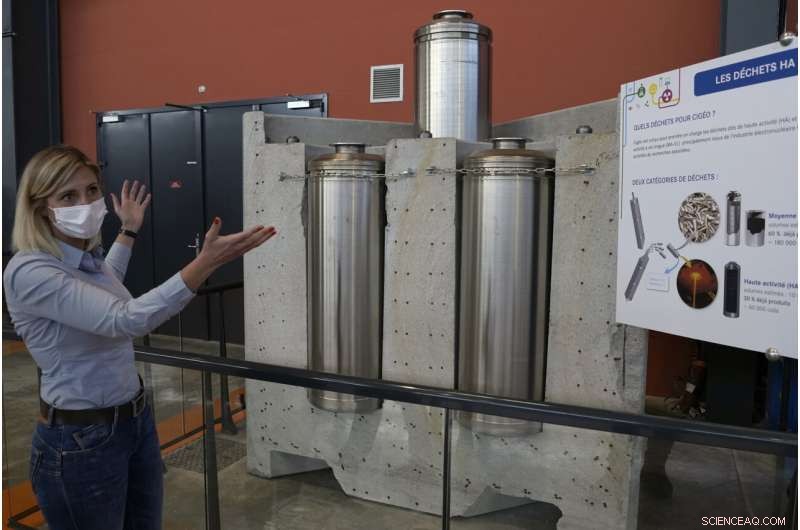
Audrey Guillemenet, geóloga e porta-voz, mostra um projeto para resíduos radioativos executado pela agência francesa de gerenciamento de resíduos radioativos Andra, em Bure, leste da França, quinta-feira, 28 de outubro de 2021. A energia nuclear é um ponto central de discórdia enquanto os negociadores planejam o futuro do mundo estratégia energética nas conversações sobre o clima em Glasgow, Escócia. Crédito:AP Photo/François Mori
As unidades de armazenamento detêm 90% dos resíduos radioativos de baixa a média atividade da França, incluindo ferramentas, roupas e outros materiais ligados à operação e manutenção do reator. O local foi projetado para durar pelo menos 300 anos após a chegada da última remessa, quando a radioatividade de seu conteúdo não deve ser superior aos níveis encontrados na natureza.
Para resíduos de vida longa – principalmente combustível nuclear usado, que permanece potencialmente mortal por dezenas de milhares de anos – a França está lançando as bases para um repositório permanente e profundo sob campos de milho e trigo fora da aldeia vizinha de casas de pedra de Bure.
A cerca de 500 metros abaixo da superfície, os trabalhadores realizam testes no barro e no granito, esculpem túneis e procuram provar que o plano de armazenamento de longo prazo é a solução mais segura para as gerações futuras. Sites semelhantes estão em desenvolvimento ou estudo em outros países também.
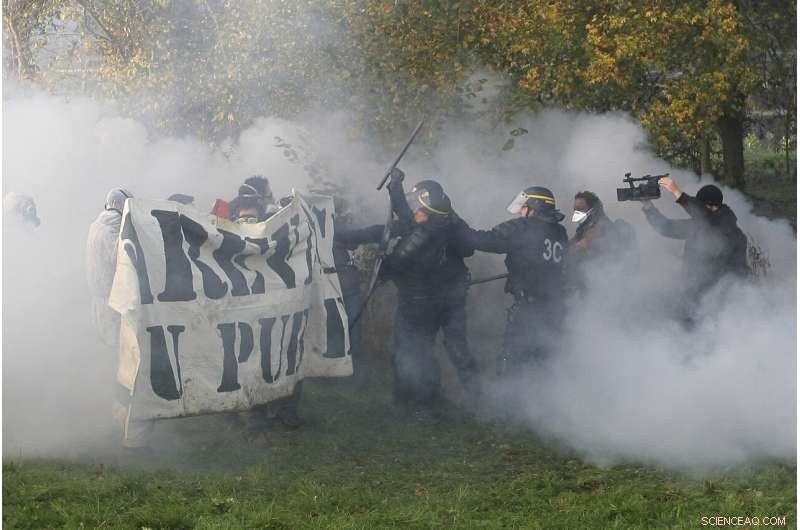
Um grupo de ativistas entra em confronto com policiais de choque na manhã de quarta-feira, 23 de novembro de 2011, em Lieusaint, Normandia, França, enquanto tentam bloquear os trilhos do trem em um esforço para parar um trem carregado com lixo nuclear e indo para Gorleben, na Alemanha . A energia nuclear é um ponto de discórdia central, enquanto os negociadores traçam a futura estratégia energética do mundo nas negociações sobre o clima em Glasgow, na Escócia. Os críticos criticam seu preço gigantesco, os danos desproporcionais causados por acidentes nucleares e resíduos radioativos. Mas um campo pró-nuclear em crescimento argumenta que é mais seguro, em média, do que quase qualquer outra fonte de energia. Crédito:AP Photo/David Vincent, Arquivo
Se o repositório obtiver a aprovação regulatória francesa, conterá cerca de 85.000 toneladas métricas (94.000 toneladas) dos resíduos mais radioativos produzidos "desde o início da era nuclear até o fim das instalações nucleares existentes", disse Audrey Guillemenet, geóloga e porta-voz da o laboratório subterrâneo.
"Não podemos deixar esses resíduos em locais de armazenamento na superfície", onde está agora, disse ela. "Isso é seguro, mas não sustentável."
O custo de 25 bilhões de euros (US$ 29 bilhões) do repositório proposto já está embutido no orçamento das concessionárias francesas, disse Guillemenet. Mas isso é apenas uma parte do incrível custo de construção e operação de usinas nucleares, e uma das razões pelas quais a oposição é abundante.
Ao redor de Bure, as placas de rua são substituídas por pichações que dizem "Nuclear is Over", e ativistas acampam no principal cruzamento da cidade.
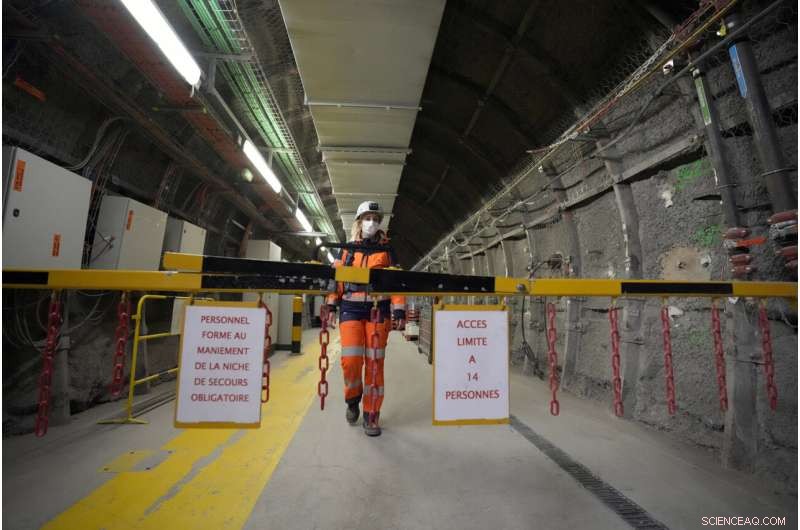
Audrey Guillemenet, geologist and spokesperson, walks in a tunnel for radioactive waste next to the emergency safety room in an underground laboratory run by French radioactive waste management agency Andra, in Bure, eastern France, Thursday, Oct. 28, 2021. Nuclear power is a central sticking point as negotiators plot out the world's future energy strategy at the climate talks in Glasgow, Scotland. Credit:AP Photo/Francois Mori
Greenpeace accuses the French nuclear industry of fobbing off waste on other countries and covering up problems at nuclear facilities, which industry officials deny. Activists staged a protest last week in the port of Dunkirk, as reprocessed uranium was being loaded onto a ship for St. Petersburg, demanding an end to nuclear energy and more research into solutions for existing waste.
"Nuclear waste ... needs to be dealt with," Bowen said. But "with fossil fuels, the waste is pumped into our atmosphere, which is threatening us from the risks of climate change and public health impacts from air pollution."
Some prominent scientists now embrace nuclear. They argue that over the past half-century, nuclear power stations have avoided the emission of an estimated 60 billion tons of carbon dioxide by providing energy that otherwise would have come from fossil fuels.
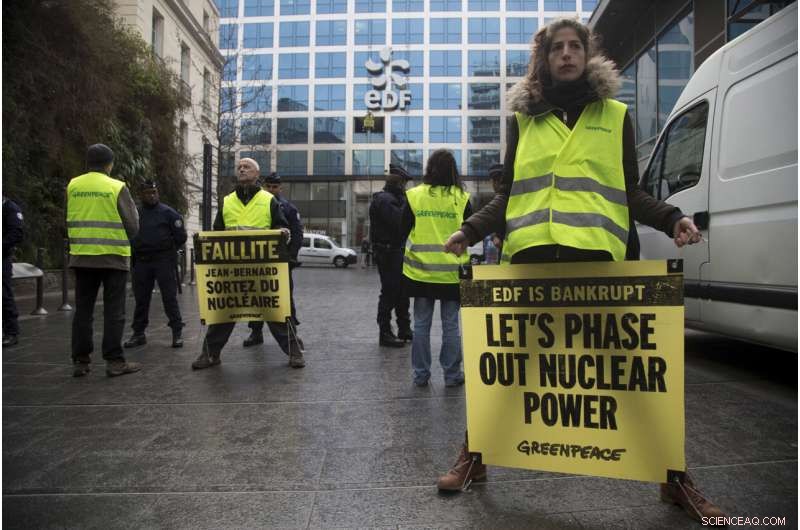
Greenpeace activists hold placards during the presentation of EDF group's 2016 results in Paris, Feb. 14, 2017. Greenpeace accuses the French nuclear industry of fobbing off waste on other countries and covering up problems at nuclear facilities, which industry officials deny. Credit:AP Photo/Thibault Camus, File
U.S. climate envoy John Kerry says he's changed his early career opposition to nuclear because of the greater necessity to cut emissions.
"People are beginning to understand the consequences of not going nuclear," said Kerry Emanuel, professor of atmospheric science at MIT. Amid a "growing awareness of the rise of climate risks around the world, people are beginning to say, 'that's a bit more frightening than nuclear power plants.'"
Some activists want to end nuclear energy today, and others want to phase it out soon. But Emanuel noted examples of countries or states that shut nuclear plants before renewables were ready to take up the slack—and had to return to coal or other planet-choking energy sources.
The current energy crunch is giving nuclear advocates another argument. With oil and gas costs driving an energy price crisis across Europe and beyond, French President Emmanuel Macron has trumpeted "European renewables and, of course, European nuclear."
-
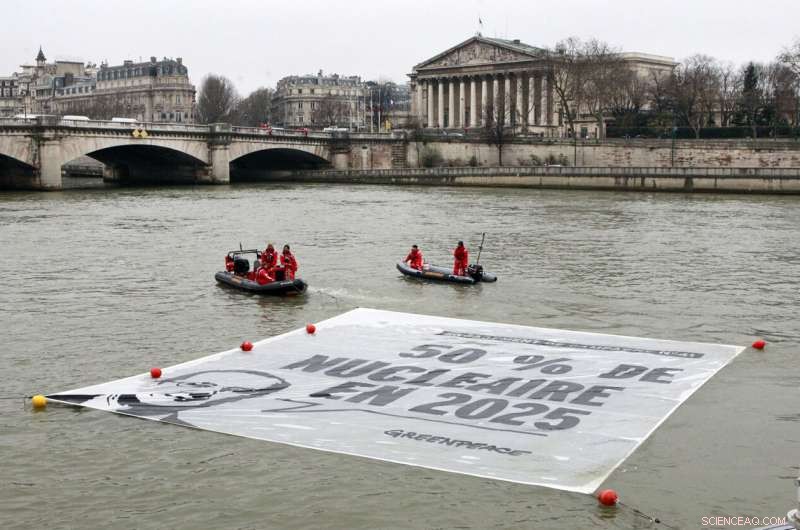
Greenpeace activists unfold a banner reading "50 percent of nuclear energy by 2025" on the Seine River in front of the National Assembly in Paris, Monday, March 9, 2015. Greenpeace accuses the French nuclear industry of fobbing off waste on other countries and covering up problems at nuclear facilities, which industry officials deny. Credit:AP Photo/Remy de la Mauviniere, File
-
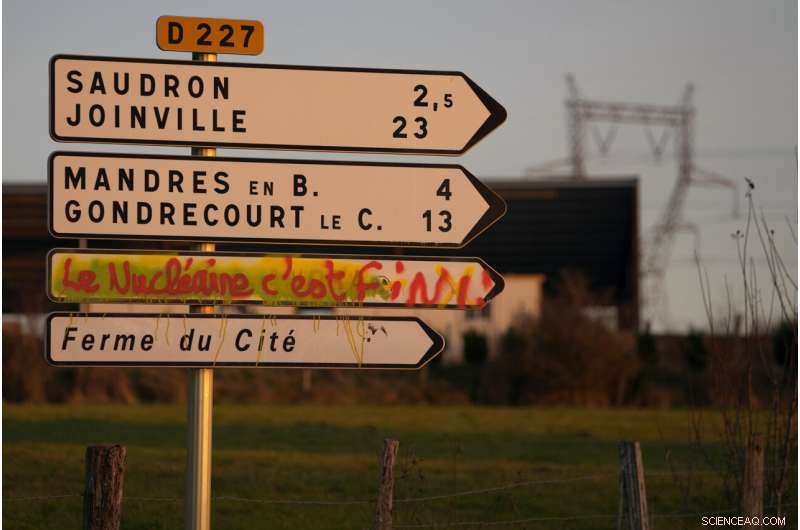
A road sign is painted with "Nuclear Is Over" next to an underground laboratory in Bure, eastern France, Thursday, Oct. 28, 2021. Nuclear power is a central sticking point as negotiators plot out the world's future energy strategy at the climate talks in Glasgow, Scotland. Credit:AP Photo/Francois Mori
-

Audrey Guillemenet, geologist and spokesperson, shows a tunnel project map for radioactive waste in an underground laboratory run by French radioactive waste management agency Andra, in Bure, eastern France, Thursday, Oct. 28, 2021. Nuclear power is a central sticking point as negotiators plot out the world's future energy strategy at the climate talks in Glasgow, Scotland. Credit:AP Photo/Francois Mori
-
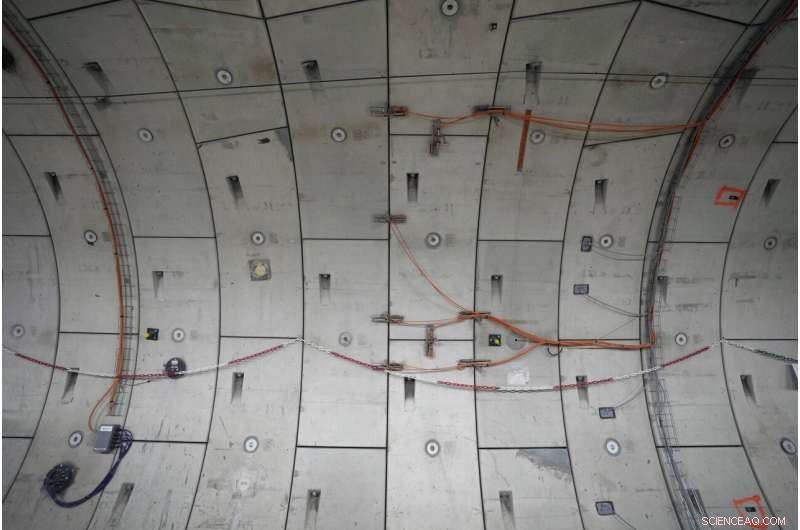
Measuring equipment and seismic detectors are placed in a tunnel for radioactive waste in an underground laboratory run by French radioactive waste management agency Andra, in Bure, eastern France, Thursday, Oct. 28, 2021. Nuclear power is a central sticking point as negotiators plot out the world's future energy strategy at the climate talks in Glasgow, Scotland. Credit:AP Photo/Francois Mori
-
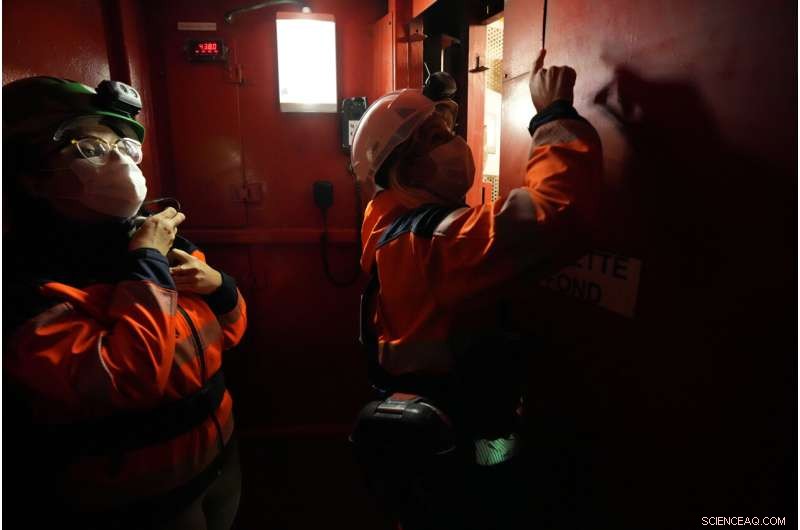
Emilie Grandidier, spokesperson for French radioactive waste management agency Andra, left, and Audrey Guillemenet, geologist and spokesperson, stand in the elevator in Bure, eastern France, Thursday, Oct. 28, 2021. Nuclear power is a central sticking point as negotiators plot out the world's future energy strategy at the climate talks in Glasgow, Scotland. Credit:AP Photo/Francois Mori
-
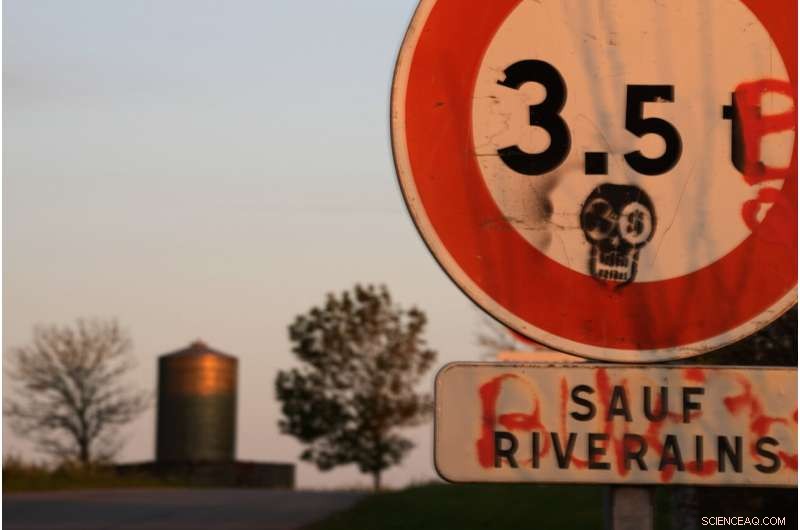
A road sign is painted with a mask with nuclear logos next to an underground laboratory run by French radioactive waste management agency Andra, in Bure, eastern France, Thursday, Oct. 28, 2021. Nuclear power is a central sticking point as negotiators plot out the world's future energy strategy at the climate talks in Glasgow, Scotland. France is laying the groundwork for a permanent, deep-earth repository beneath corn and wheat fields outside the nearby stone-house hamlet of Bure. Credit:AP Photo/Francois Mori
-
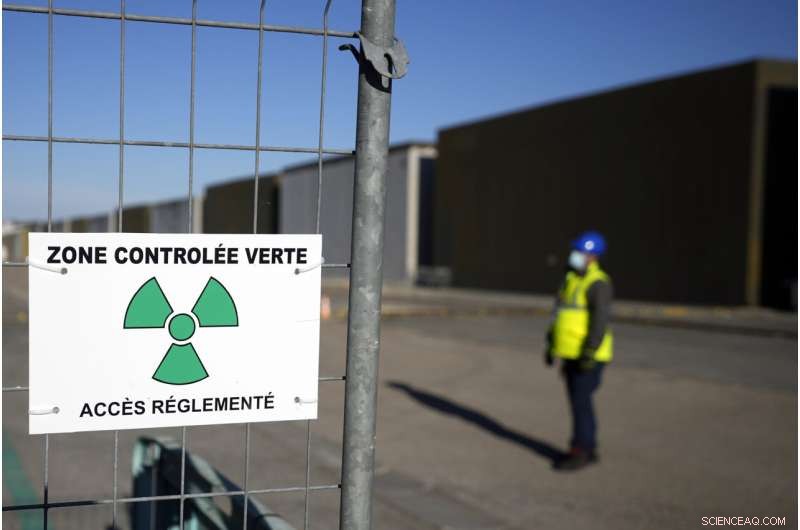
A technician stands next to a radioactive waste storage zone along a concrete-sealed warehouse in the Aube region of eastern France in Soulaines-Dhuys, Friday, Oct. 29, 2021. The site holds low- to mid-level radioactive waste from French nuclear plants as well as research and medical facilities, and its concrete-sealed warehouses are designed to store the waste for at least 300 years. Credit:AP Photo/Francois Mori
-
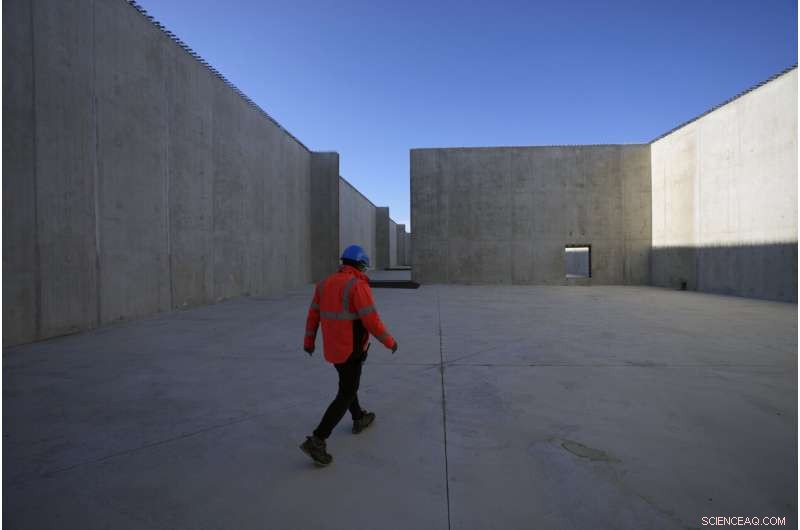
Thierry Pochot, spokesperson for radioactive waste storage sites in the Aube region of eastern France managed by French radioactive waste management agency Andra, walks in a concrete-sealed warehouse in Soulaines-Dhuys, Friday, Oct. 29, 2021. The site holds low- to mid-level radioactive waste from French nuclear plants as well as research and medical facilities, and its concrete-sealed warehouses are designed to store the waste for at least 300 years. Credit:AP Photo/Francois Mori
-
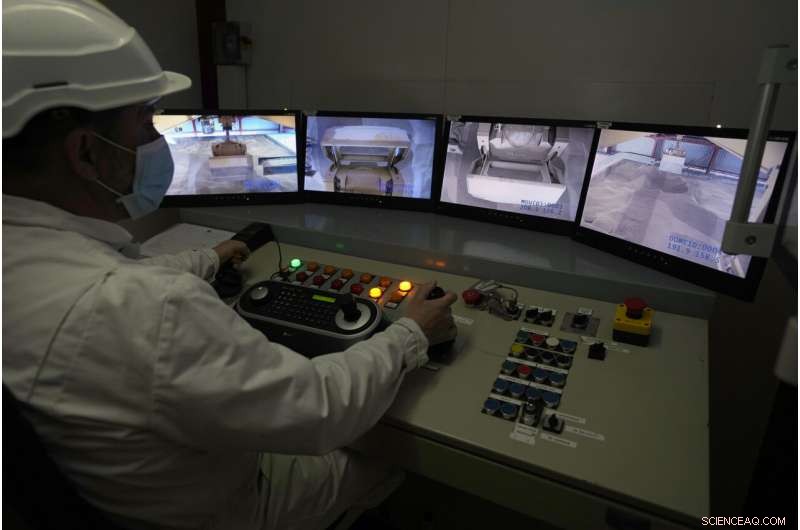
A technician pilots robots for radioactive waste storage in a concrete-sealed warehouse in the Aube region of eastern France in Soulaines-Dhuys, Friday, Oct. 29, 2021. The site holds low- to mid-level radioactive waste from French nuclear plants as well as research and medical facilities, and its concrete-sealed warehouses are designed to store the waste for at least 300 years. Credit:AP Photo/Francois Mori
-
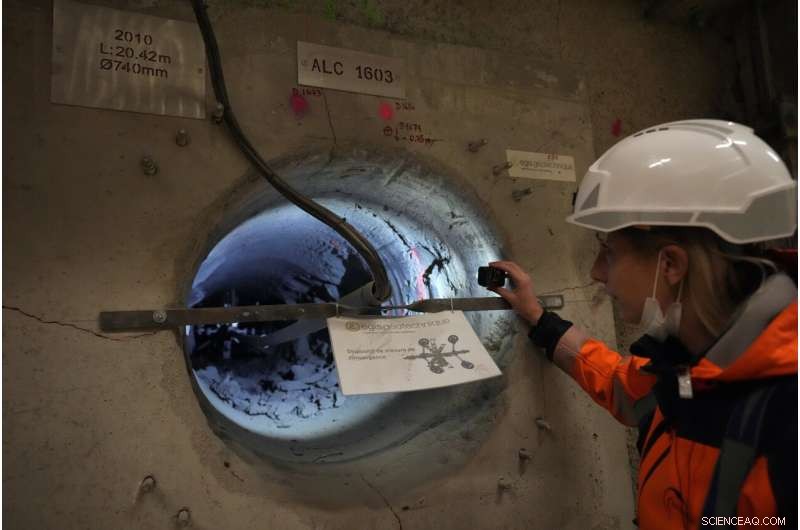
Audrey Guillemenet, geologist and spokesperson, shows a tunnel for radioactive waste in an underground laboratory run by French radioactive waste management agency Andra, in Bure, eastern France, Thursday, Oct. 28, 2021. Nuclear power is a central sticking point as negotiators plot out the world's future energy strategy at the climate talks in Glasgow, Scotland. Credit:AP Photo/Francois Mori
-
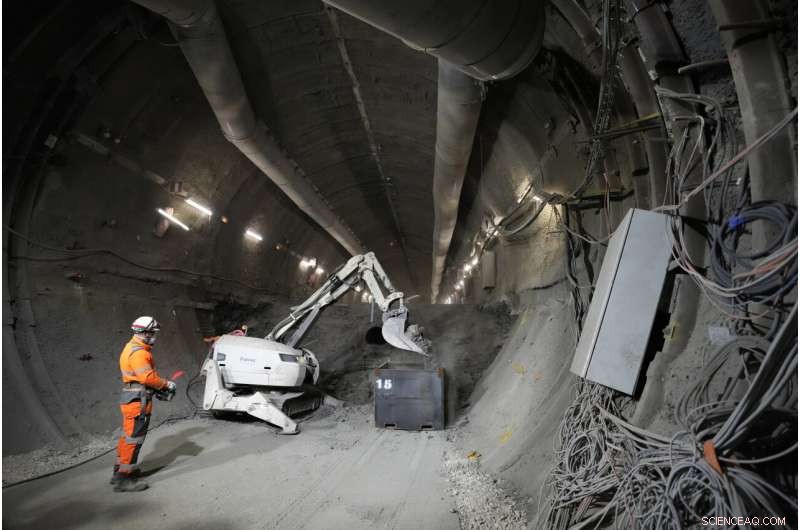
Technicians work in a tunnel for radioactive waste in an underground laboratory run by French radioactive waste management agency Andra, in Bure, eastern France, Thursday, Oct. 28, 2021. Nuclear power is a central sticking point as negotiators plot out the world's future energy strategy at the climate talks in Glasgow, Scotland. Credit:AP Photo/Francois Mori
-
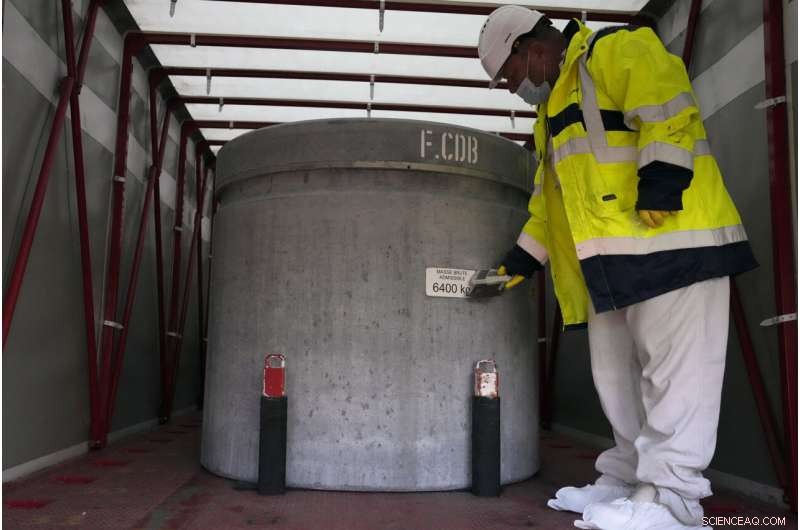
A technician works inside a truck with radioactive waste in the Aube region of eastern France, in Soulaines-Dhuys, Friday, Oct. 29, 2021. Deep in a French forest of oaks, birches and pines, a steady stream of trucks carries a silent reminder of nuclear energy's often invisible cost:canisters of radioactive waste, heading into storage for the next 300 years. Credit:AP Photo/Francois Mori
-
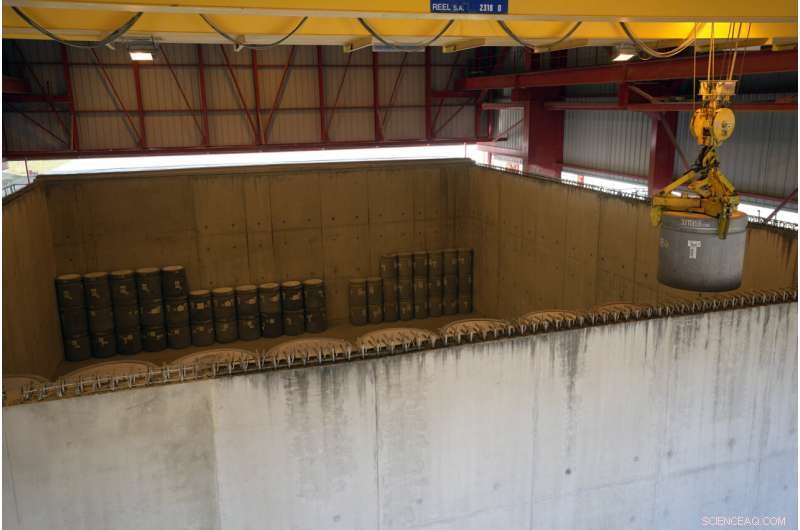
A radioactive waste storage is lifted in a concrete-sealed warehouse in the Aube region of eastern France managed by French radioactive waste management agency Andra, in Soulaines-Dhuys, Friday, Oct. 29, 2021. The site holds low- to mid-level radioactive waste from French nuclear plants as well as research and medical facilities, and its concrete-sealed warehouses are designed to store the waste for at least 300 years. Credit:AP Photo/Francois Mori
-
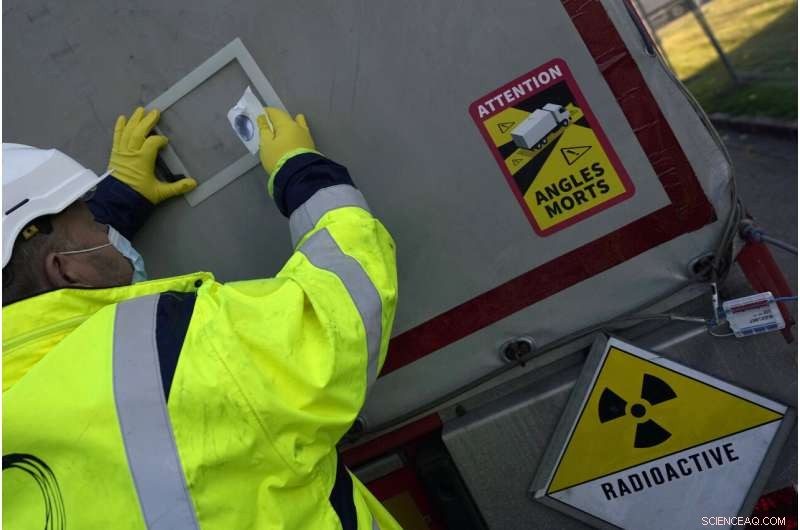
A technician controls a truck with radioactive waste in the Aube region of eastern France managed by French radioactive waste management agency Andra, in Soulaines-Dhuys, Friday, Oct. 29, 2021. Deep in a French forest of oaks, birches and pines, a steady stream of trucks carries a silent reminder of nuclear energy's often invisible cost:canisters of radioactive waste, heading into storage for the next 300 years. Credit:AP Photo/Francois Mori
-
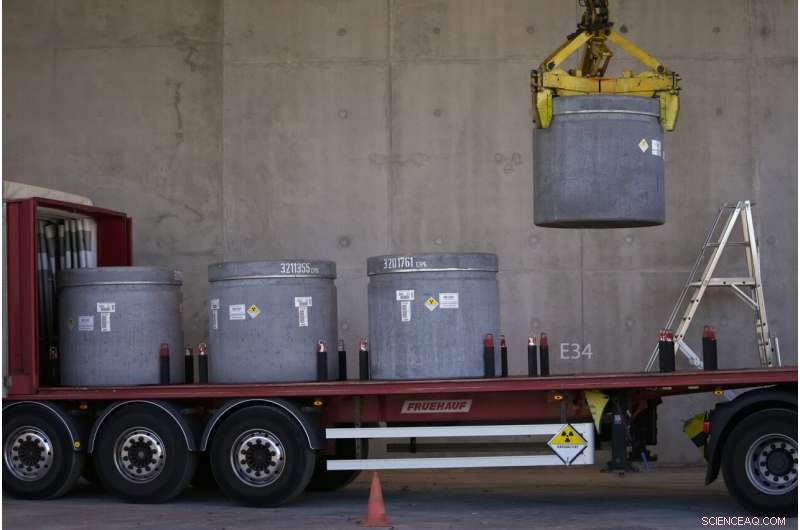
Radioactive waste storage is lifted from a truck in a concrete-sealed warehouse in the Aube region of eastern France managed by French radioactive waste management agency Andra, in Soulaines-Dhuys, Friday, Oct. 29, 2021. Deep in a French forest of oaks, birches and pines, a steady stream of trucks carries a silent reminder of nuclear energy's often invisible cost:canisters of radioactive waste, heading into storage for the next 300 years. Credit:AP Photo/Francois Mori
-
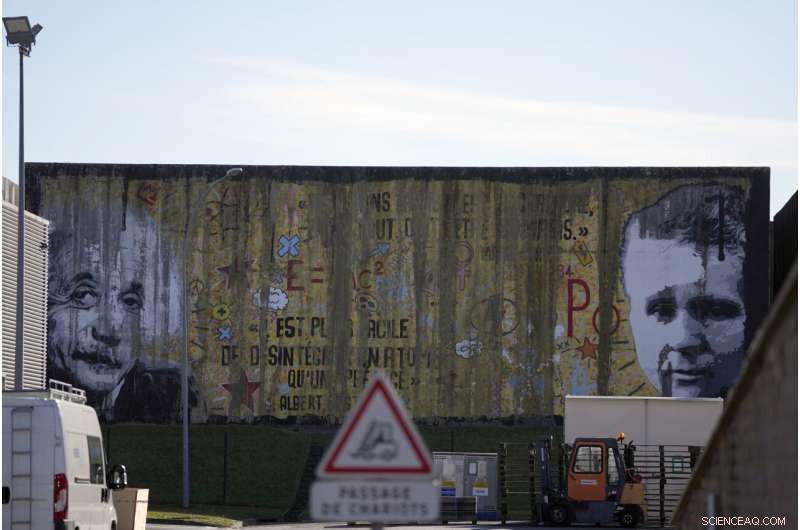
Portraits of scientists Albert Einstein and Marie Curie decorate a concrete-sealed warehouse for radioactive waste storage in Soulaines-Dhuys, eastern France, Friday, Oct. 29, 2021. The site holds low- to mid-level radioactive waste from French nuclear plants as well as research and medical facilities, and its concrete-sealed warehouses are designed to store the waste for at least 300 years. Credit:AP Photo/Francois Mori
-
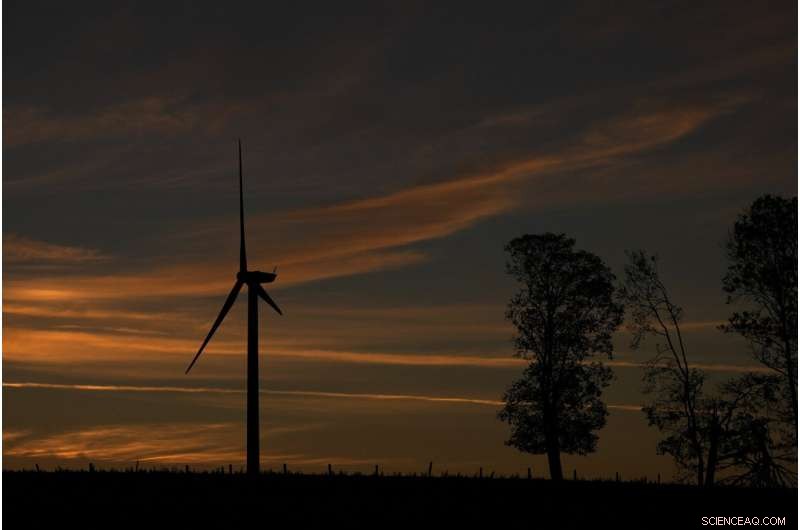
An electricity windmills stands next to an underground laboratory run by French radioactive waste management agency Andra, in Bure, eastern France, Thursday, Oct. 28, 2021. The laboratory, at around 500 meters below the surface, is designed to prepare for a proposed long-term deep-earth nuclear waste repository. Credit:AP Photo/Francois Mori
-
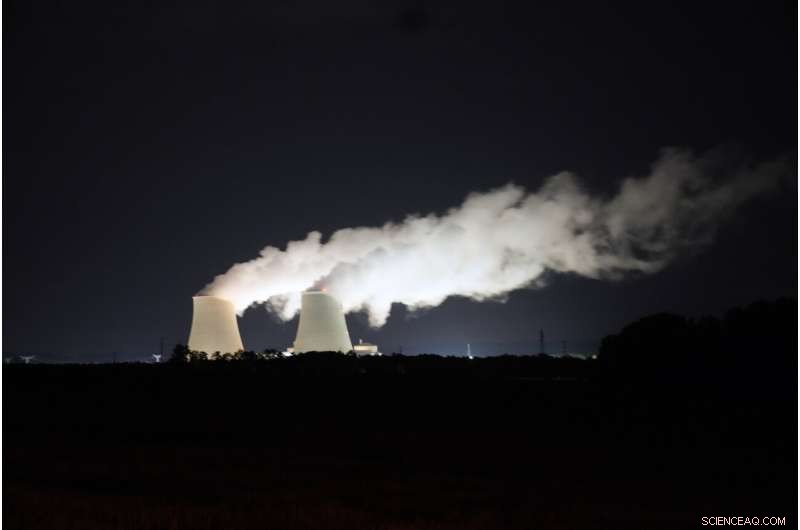
Steam escapes at night from the nuclear plant of Nogent-sur-Seine, 110 kms (63 miles) south east of Paris, Sunday, Aug. 8, 2021. Nuclear power is a central sticking point as negotiators plot out the world's future energy strategy at the Glasgow climate talks. Critics decry its mammoth price tag, the accident risk and deadly waste. But a growing pro-nuclear camp argues that it's safer on average than nearly any other energy source. Credit:AP Photo/Francois Mori, File
The waste, meanwhile, isn't going away.
To make radioactive garbage dumps less worrying to local residents, Andra organizes school visits; one site even hosts an escape game. Waste storage researchers are readying for all kinds of potential future threats—revolution, extreme weather, even the next Ice Age, Guillemenet said.
Whatever happens in Glasgow, "whether we decide to go on with the nuclear energy or not," she said, "we will need to find a solution for the management of that nuclear waste" that humankind has already produced.
























